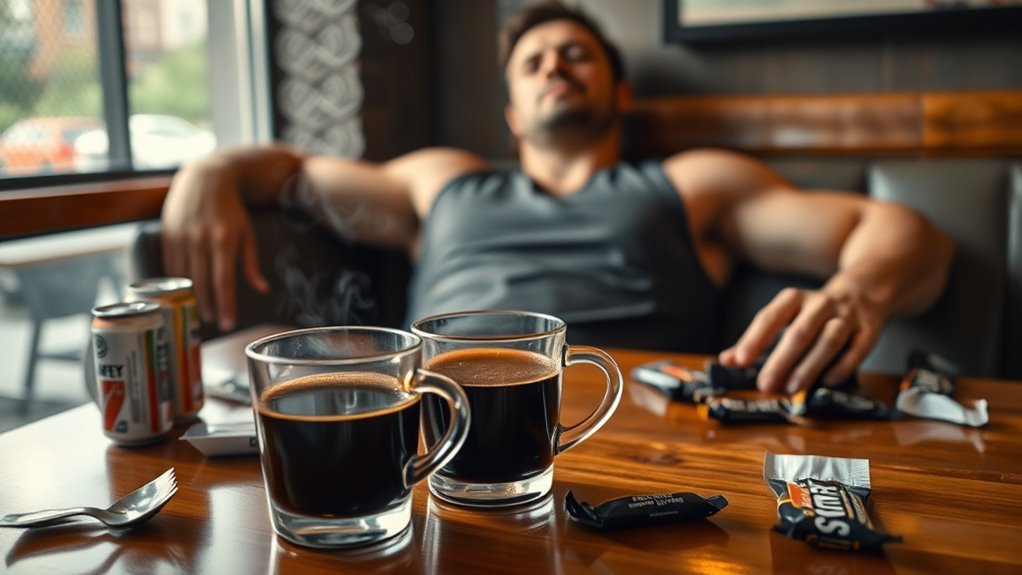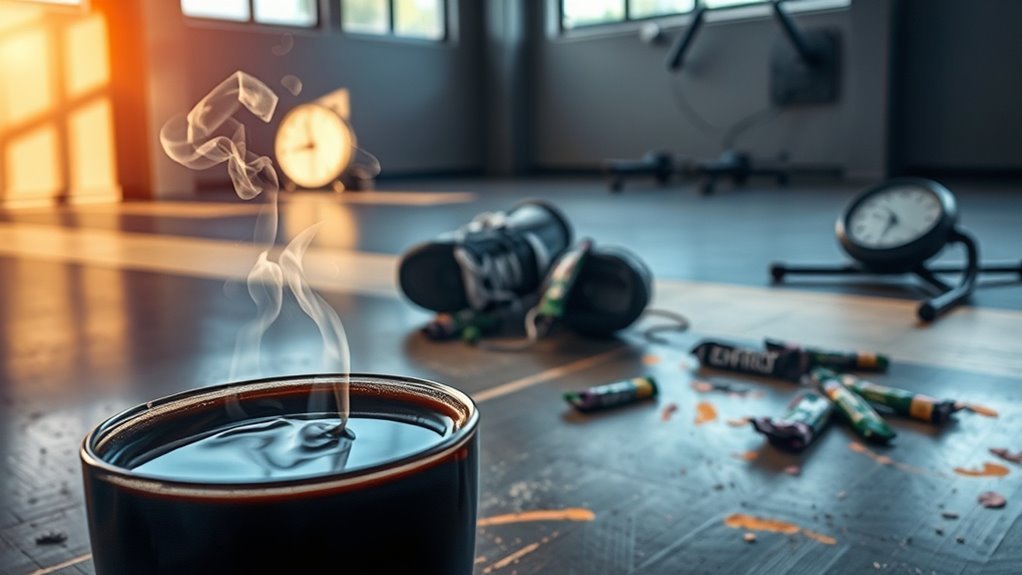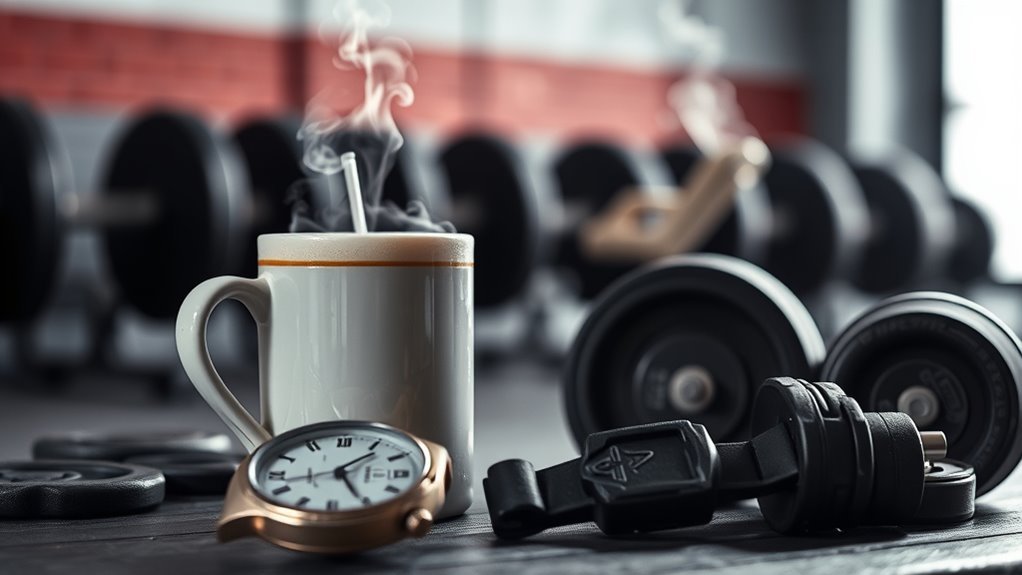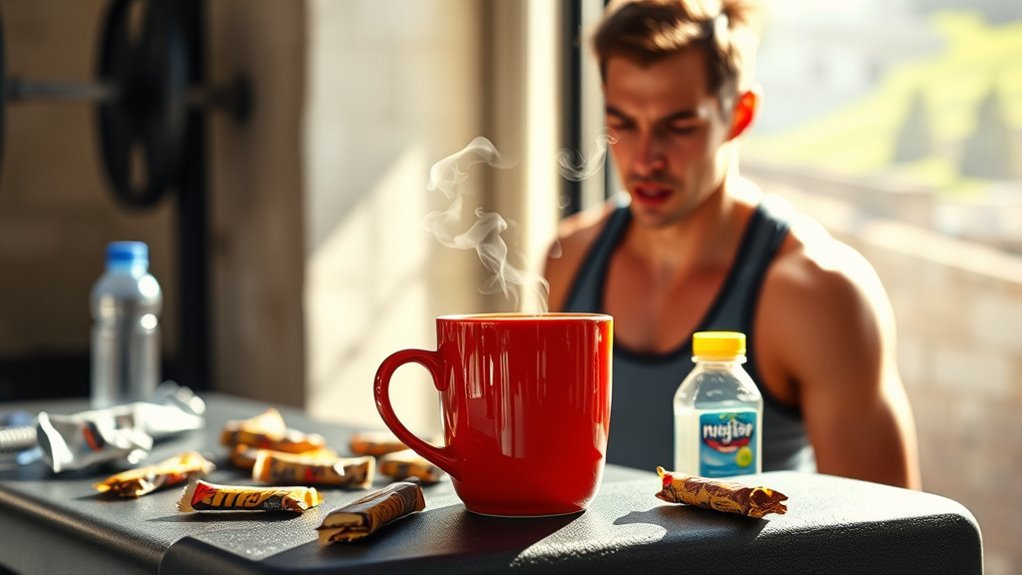The Worst Coffee Habits for Workout Performance
Your worst coffee habits could be hurting your workout performance. Overindulging in caffeine leads to tolerance and dependency, while drinking coffee too close to workouts can cause jitters. Skipping hydration and relying solely on coffee for energy may result in fatigue, and sugary drinks can spike blood sugar, leading to crashes. Ignoring the quality of your coffee or using it as a meal replacement only complicates matters. Understanding these pitfalls can enhance your performance, and there’s much more to reflect on.
Overindulging in Caffeine

Although many people swear by their morning coffee to kickstart their workouts, overindulging in caffeine can actually hinder performance. When you consume excessive amounts, you may develop caffeine tolerance, meaning you’ll need more to achieve the same energy boost. This can lead to a cycle of dependency, where withdrawal symptoms like headaches and fatigue may hit if you skip your usual intake, leaving you feeling sluggish during workouts. Furthermore, too much caffeine can increase anxiety and jitteriness, impacting your focus and coordination. For peak performance, consider moderating your intake to maintain energy levels without relying on a caffeine crutch. By finding a balance, you can enjoy the benefits of caffeine without the downsides that come with overindulgence.
Drinking Coffee Too Close to Workout Time
Timing your coffee consumption is essential for ideal workout performance. If you drink coffee too close to your workout, you might experience jitters or dehydration, which can hinder your energy levels. To get the most out of caffeine, aim to enjoy your coffee about 30 to 60 minutes before exercising.
Timing Matters for Performance
When you consume coffee too close to your workout, you might not reap the performance benefits you expect. For pre workout caffeine to be effective, ideal timing is essential. Here are four points to evaluate:
- 30-60 Minutes Prior: Aim to drink your coffee about 30 to 60 minutes before exercising for maximum absorption.
- Avoid the Last-Minute Sip: Drinking coffee just before working out can lead to jitters or digestive issues.
- Experiment with Timing: Everyone’s metabolism is different. Try varying your coffee timing to find what works best for you.
- Listen to Your Body: Pay attention to how your body responds to caffeine and adjust your consumption accordingly.
Caffeine’s Impact on Energy
Caffeine can be a powerful ally in enhancing your energy levels and workout performance, but drinking coffee too close to your exercise session can backfire. When you consume caffeine, it takes about 30 to 60 minutes to reach peak levels in your bloodstream. If you drink coffee right before working out, it might lead to increased heart rate or jitters, negatively affecting your performance. Your body’s caffeine metabolism varies; some individuals process it quickly, while others do so slowly. Finding the right timing is essential. Aim to consume your coffee about an hour before exercising to maximize its benefits without risking unwanted side effects. This way, you can enjoy improved energy levels and get the most out of your workout.
Hydration and Coffee Balance
Although coffee can provide a much-needed energy boost, consuming it too close to your workout can disrupt your hydration balance. To maintain ideal performance, consider these tips for coffee moderation:
- Timing: Wait at least 30-60 minutes after drinking coffee before hitting the gym.
- Water Intake: Match each cup of coffee with an equal amount of water to offset dehydration.
- Caffeine Content: Be mindful of how much caffeine you consume; too much can lead to increased urination and dehydration.
- Listen to Your Body: Pay attention to how your body reacts; if you feel jittery or dehydrated, adjust your coffee consumption.
Skipping Hydration
Hydration plays an essential role in optimizing workout performance, yet many athletes overlook its importance. Skipping hydration can lead to fatigue, decreased strength, and impaired focus—none of which you want during a workout. To maintain your energy levels, consider effective hydration strategies, like drinking water before, during, and after exercise. Remember, it’s not just about water; you also need to maintain your electrolyte balance, especially if you’re sweating profusely. Incorporating electrolyte-rich drinks can help replenish what you lose. So, don’t let a lack of hydration sabotage your efforts. Make it a priority, listen to your body, and guarantee you’re fueling it properly. Your performance will thank you, and you’ll enjoy the freedom to push your limits without the risk of dehydration.
Relying Solely on Coffee for Energy

While many people turn to coffee for a quick energy boost before workouts, relying solely on it can be counterproductive. This coffee dependency can lead to energy crashes that diminish your performance. To optimize your energy levels, consider the following:
- Balanced Diet: Fuel your body with nutritious foods for sustained energy.
- Hydration: Drink water consistently to avoid fatigue and enhance performance.
- Adequate Sleep: Prioritize rest to boost your natural energy levels.
- Cross-Training: Incorporate different workouts to keep your energy up and avoid burnout.
Choosing Sugary Coffee Drinks
When you choose sugary coffee drinks, you’re not just indulging in a tasty treat; you’re also packing in extra calories that can hinder your workout performance. These high sugar levels can cause blood sugar spikes, leading to energy crashes that leave you feeling sluggish. Additionally, the caffeine and sugar combination can increase your risk of dehydration, which is essential to avoid during any physical activity.
High Calorie Intake
Choosing sugary coffee drinks before a workout can considerably undermine your performance, as these high-calorie options often lead to energy crashes rather than sustained stamina. Instead of fueling your body properly, you risk weight gain and reduced effectiveness during your exercise routine. To make smarter choices, consider these tips:
- Opt for black coffee or espresso to minimize calorie intake.
- Add a splash of unsweetened almond milk instead of sugary creamers.
- Use natural sweeteners like stevia or monk fruit for flavor without added calories.
- Choose low-calorie flavored coffee options that satisfy your taste without the excess sugar.
Blood Sugar Spikes
Consuming sugary coffee drinks before a workout can lead to significant blood sugar spikes, which may hinder your performance. When you indulge in these sweetened beverages, your body experiences a rapid increase in glucose levels, triggering a strong insulin response. This can cause your energy levels to plummet shortly after, leaving you fatigued and unable to perform at your best. Effective blood sugar management is vital for maintaining stable energy levels throughout your workout. Instead of sugary options, consider opting for black coffee or adding a small amount of natural sweetener. This way, you’ll support your energy needs without the risk of those frustrating spikes and crashes, allowing you to enjoy your workout with freedom and vigor.
Dehydration Risks
Sugary coffee drinks can also pose a significant risk of dehydration, especially when consumed before a workout. These drinks often lead to increased dehydration symptoms, such as fatigue and headaches, which can severely impact your performance. To help maintain hydration, consider these strategies:
- Choose Plain Coffee: Opt for black coffee to avoid excess sugars.
- Stay Hydrated: Drink water alongside your coffee to balance out fluid loss.
- Limit High-Calorie Additives: Avoid creamers and syrups that can exacerbate dehydration.
- Time Your Intake: Wait at least 30 minutes post-coffee before exercising to allow your body to rehydrate.
Ignoring Quality of Coffee Beans
While you might think any cup of coffee will do before your workout, ignoring the quality of coffee beans can greatly impact your performance. The origins of your coffee matter; beans sourced from specific regions may offer unique flavors and higher caffeine content, which can enhance your energy levels. Freshness is vital, too—stale beans lose their vibrant flavors and potential benefits. When you choose high-quality, fresh beans, you’re not just enjoying better-tasting coffee; you’re fueling your body with the nutrients needed for peak performance. Opt for whole beans and grind them just before brewing to maximize freshness. Investing in quality coffee can transform your pre-workout ritual and help you release your full potential during exercise. Make every sip count!
Neglecting Timing of Protein Intake

Choosing high-quality coffee can elevate your workout, but neglecting the timing of protein intake can undermine your efforts. Proper timing is essential for maximizing protein synthesis and enhancing post-workout recovery. Here are four key points to take into account:
- Immediate Intake: Consume protein within 30 minutes post-exercise to kickstart recovery.
- Balanced Ratios: Aim for a 3:1 ratio of carbs to protein, which helps replenish glycogen stores and supports muscle repair.
- Consistent Schedule: Regular protein intake throughout the day maintains muscle growth and prevents breakdown.
- Hydration: Don’t forget to hydrate—coffee can be dehydrating, impacting recovery and performance.
Using Coffee as a Meal Replacement
Although coffee can provide a quick energy boost, relying on it as a meal replacement is a risky habit that can hinder your workout performance. When you skip meals in favor of caffeine, you miss out on essential nutrients needed for energy, recovery, and overall health. Proper meal timing is vital for fueling your body and optimizing performance. Without a balanced intake of carbohydrates, proteins, and fats, your nutrient balance is thrown off, leading to fatigue and decreased strength. Instead of using coffee as a substitute, pair it with a nutritious meal to enhance your energy levels naturally. Embrace the freedom to nourish your body adequately, ensuring you’re well-prepared for your workouts and achieving your fitness goals.
Failing to Listen to Your Body

Relying on coffee for energy can lead to ignoring the signals your body sends about its needs. When you’re constantly caffeinated, you might miss important listening cues that indicate when to rest or fuel your body properly. This could hinder your workout performance and overall well-being. Here are four common body signals you shouldn’t ignore:
- Fatigue: Persistent tiredness can signal the need for rest, not more caffeine.
- Dehydration: If you’re feeling thirsty, it’s time to hydrate, not grab another cup of coffee.
- Increased Heart Rate: This may indicate too much caffeine; listen and cut back.
- Digestive Issues: Stomach discomfort can mean your body needs a break from coffee.
Tune in to your body; it knows best.
Frequently Asked Questions
Can Coffee Enhance Muscle Recovery After Workouts?
Yes, coffee can enhance muscle recovery after workouts, primarily due to its caffeine content. Timing matters; consuming caffeine shortly after exercise may improve recovery protocols by reducing muscle soreness and fatigue. Studies suggest that caffeine can help replenish glycogen stores when paired with carbohydrates. So, if you’re looking for a practical way to boost your recovery process, consider enjoying a cup of coffee after your workout, but be mindful of your overall caffeine intake.
Are There Any Benefits to Drinking Decaf Coffee Before Exercising?
Imagine soaring through your workout like a superhero! While decaf coffee won’t give you superhuman strength, it does have its benefits. Drinking decaf before exercising may help with hydration and provide antioxidants, potentially enhancing workout performance. Though it lacks caffeine’s stimulating effects, decaf can still contribute to your overall routine. So, if you enjoy the taste and want a gentler boost, decaf might just be your secret weapon in the gym!
How Does Coffee Affect Sleep Quality for Athletes?
Coffee can greatly impact your sleep quality, especially if you’re an athlete. Caffeine affects your coffee metabolism, and if you consume it too close to bedtime, it can interfere with your sleep cycle. Timing is vital; try limiting caffeine intake to earlier in the day. This way, you can enjoy the benefits of coffee without compromising your rest. Prioritizing sleep is essential for recovery and performance, so find a balance that works for you.
Is It Safe to Combine Coffee With Energy Drinks?
Combining coffee with energy drinks isn’t without risks, so it’s important to take into account caffeine synergy. While both can boost energy, excessive caffeine intake may lead to jitters, increased heart rate, or anxiety. It’s vital to be mindful of your total caffeine consumption and understand energy drink safety guidelines. If you enjoy both, try to space them out to prevent overload. Always listen to your body and adjust accordingly for best performance.
What Are the Signs of Caffeine Overdose During Workouts?
When you’re pushing your limits, you might not notice the subtle signs of caffeine’s mischievous side. If you experience jitters, excessive sweating, or a racing heart, it could be your body signaling caffeine toxicity symptoms. These can lead to a workout performance decline, stealing your energy and focus. Staying aware of your intake can help you maintain that sense of freedom during your workouts, ensuring you’re in tune with your body’s needs.






